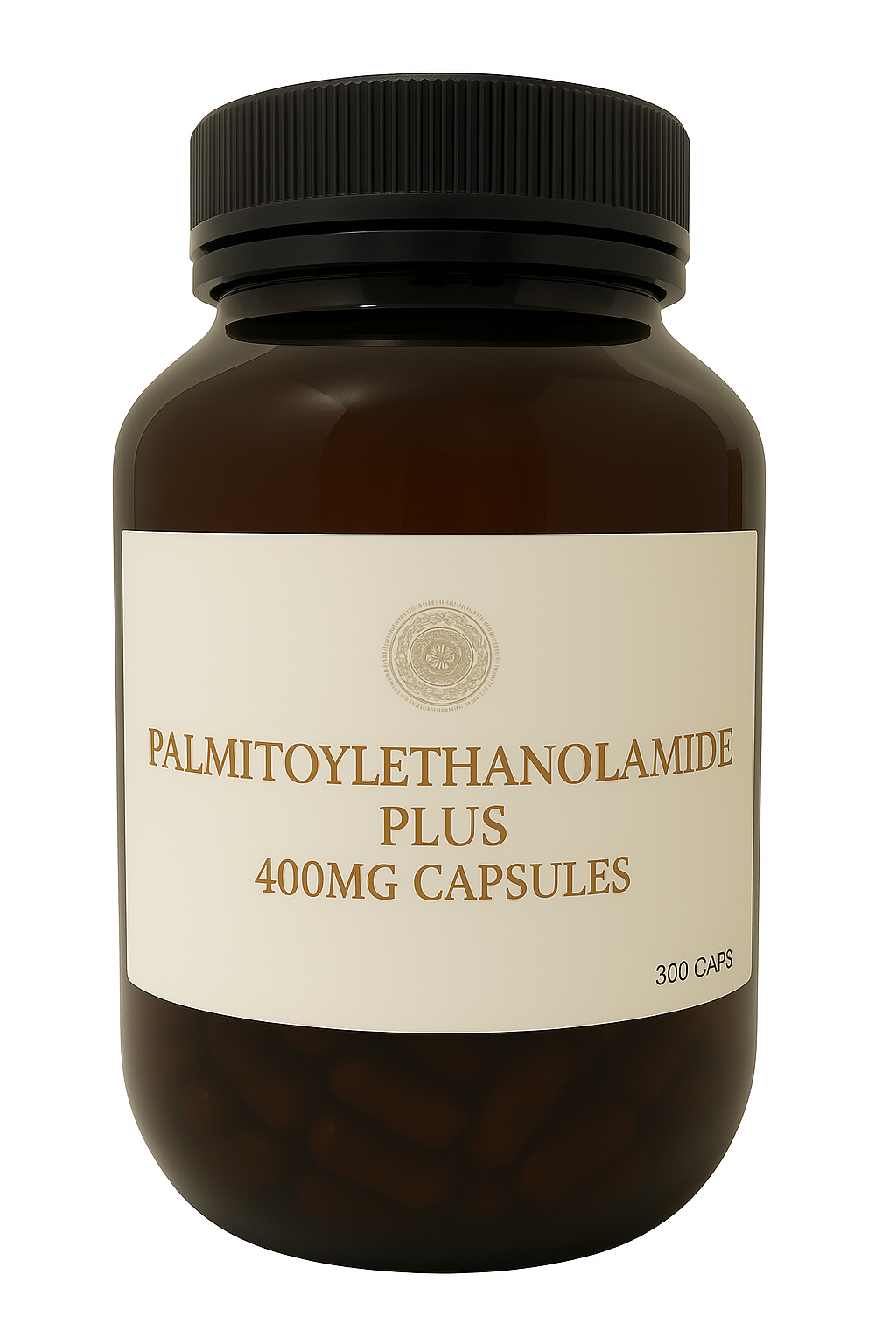Palmitoylethanolamide plus (PEA PLUS)
THE OPTIMAL PHYSIOLOGICAL QUANTITY OF B VITAMINS IN PEAPLUS CAPSULES
The Compounding Lab’s PEA Plus contains a number of specifically selected and dosed vitamins from the B group. These vitamins have an important function in the nervous and immune systems and together with PEA result in an exceptionally strong combination.
Just to list a few examples:
Vitamin B12 stimulates the production of myelin in the nervous system. This fatty white substance that surrounds the axons of the nerve cells (also called neurons) helps to conduct impulses along the nerve.
Vitamin B6 deficiency leads to a decreased production of cells that have an immunity function. Just like white blood cells, they are vital for the optimal functioning of the immune system. Therefore, adequate vitamin B6 is necessary for the immune system to function at its best. All vitamins from the B group that support the functioning of the nervous and immune systems and contribute to decreased tiredness and fatigue are added to PeaPlus.
Modern biological research shows that we need sufficient vitamins B, not too much and not too little. Too little vitamins B will not be effective and too much will lead to damage, for example to the nerves, as in the case of too much vitamin B6. That is why the quantity of vitamins B in PeaPlus is weighed precisely and combined with 400 mg of PEA per capsule.
Taking 3-6 capsules of PeaPlus per day is precisely enough and not too much. At the same time, the normal quantity of vitamins absorbed in our body through foods is also taken into account. It is however important not to take any other B-complex vitamins alongside PeaPlus, especially if these complexes contain large quantities of B6. This occurs quite often. Large quantities of vitamin B6 are presumably not good for the nervous system and neurologists advise against it. In 2000, the EFSA (the European Authority for Food Safety) has set the maximum safe daily dose in chronic use (‘tolerable upper intake level’) at 25 mg vitamin B6 per day. Taking a multi-vitamin alongside PeaPlus will not cause any harm as long as you don’t exceed the safe daily dosage.
VITAMINS B AND HOW IT SUPPORTS THE NERVOUS AND IMMUNE SYSTEMS
The vitamins B present in PeaPlus contribute to an optimal functioning of the nervous and immune systems and thereby support palmitoylethanolamide in its physiological actions. Recently, it has also emerged that a large share of the population has too low levels of B-group vitamins. However, if people just like that take high doses of B vitamins, on the one hand, they risk taking in too many of these vitamins and on the other hand, the body is not given an opportunity to absorb these vitamins in a dosed manner. That is why the Russell Science Group has selected a physiological dose of B vitamins that can be taken at least 2 times per day.
We will now briefly review all the B vitamins and discuss their contribution to optimal bodily functions.
VITAMIN B1 (THIAMINE)
Vitamin B1 (thiamine) contributes to normal energy-yielding metabolism, normal functioning of the nervous system, normal psychological functioning, and normal functioning of the heart.
It plays an essential role in releasing energy from food, the carbohydrates. This vitamin is also vital for the production of important bio-molecules, such as the molecules that carry and transmit genetic characteristics, RNA and DNA. This vitamin also supports physiological nerve functioning. Because thiamine is so important in converting carbohydrates into energy, it is mainly the nerves and heart that suffer from functional problems in the case of thiamine deficiency. The classical disorder created by vitamin B1 deficiency is beriberi. The term beriberi means ‘severely weak’. In beriberi there are disturbances in the heart and circulatory system and function disorders in the brain and nerves.
Vitamin B1 deficiency can also occur in diabetes patients, especially when they attempt to lose weight. It appears that taking vitamin B1 could support and optimise metabolism and the fat spectrum in diabetes patients.
Vitamin B1 deficiency leads to neuropathy, which is damage to the autonomic nervous system as well as other nervous systems. The cause of this is lack of energy and deficiency of substances that play an important role in the proper functioning of the nerves, such as the nerve transmitter acetylcholine and the nerve-protecting material, myelin.
Furthermore, too little vitamin B1 leads to specific disorders, such as brain impairments (Wernicke’s encephalopathy) and neuropathy: pain, irritations, tingling and numbness in the feet and hands.
VITAMIN B2 (RIBOFLAVIN)
Vitamin B2 (riboflavin) contributes to normal energy-yielding metabolism, normal functioning of the nervous system, maintaining normal vision, protection of cells against oxidation stress, and reduces tiredness and fatigue.
It plays a role in the upkeep of the nervous system, metabolism and our energy management. Furthermore, vitamin B2 is important for supporting the physiological functioning of healthy skin and vision. In addition, vitamin B2 helps to protect our body cells against damage from oxidation.
Isolated deficiencies of vitamin B2 are rare. This usually occurs together with a deficiency of other B-group vitamins.
VITAMIN B3 (NIACIN, NICOTINAMIDE) CONTRIBUTES TO NORMAL ENERGY-YIELDING METABOLISM, NORMAL FUNCTIONING OF THE NERVOUS SYSTEM AND REDUCES TIREDNESS AND FATIGUE.
There are many different names for vitamin B3: niacin, nicotinic acid, nicotinamide.
Vitamin B3 plays an important role in providing energy to the cells, functioning of the nervous system and it is also vital for healthy skin. Deficiency will lead to the pellagra disease. The term ‘pellagra’ comes from Italian and it refers to rough and painful skin: ‘pelle’ means skin and ‘agra’ means rough, painful and burning. People who also lack vitamin B3 are ones that follow an elimination diet, in other words, eliminating wheat or glutens, soy or eggs. Also people who suffer from Crohn disease, celiac disease and other chronic skin infections don’t have a normal intake of vitamins from the B group.
Severe Deficiency of vitamin B3, in addition to skin aberrations, could lead to other symptoms, such as diarrhoea and dementia, melancholy, apathy, loss of strength, headaches, disturbances in the central and peripheral nervous system (such as neuropathy), sight and touch impairments, and depression.
VITAMIN B5 (PANTOTHENIC ACID) CONTRIBUTES TO NORMAL ENERGY-YIELDING METABOLISM, NORMAL MENTAL PERFORMANCE AND THE REDUCTION OF TIREDNESS AND FATIGUE.
It plays an important role in the physiology of our cells and in the breakdown of proteins, fats and carbohydrates. Vitamin B5 assists in providing energy. In addition, it is vital in generating a number of hormones and in the functioning of the nervous system. Vitamin B5 is prevalent in meat, fish, dairy products, vegetables, potatoes and fruit. There is almost never an isolated deficiency. It is usually part of a deficiency of several types of B vitamins.
VITAMIN B6 (PYRIDOXINE)
Vitamin B6 (pyridoxine) contributes to the normal functioning of the immune system and reduces tiredness and fatigue.
It is a vital vitamin for the physiological functioning of the nervous, immune and the hormone systems. Vitamin B6 supports various enzymes that are involved in the metabolism of amino acids, in the management of cell energy, in neurotransmitters and in the exchange of lipids. Just a minor deficiency of this vitamin can right away have considerably negative and measurable effects on our metabolic processes.
Furthermore, vitamin B6 has a physiological role in the production and activities of certain hormones. Moreover, in the cell nucleus, it plays an important physiological role in keeping DNA stable, what is known as genome stability. Minor deficiencies of vitamin B6 are common, for example in diabetes.
We do however need to watch out when taking vitamin B6. It is not so bad if we take too much of nearly all the other B-complex vitamins, because when we urinate, we get rid of the excess. This however doesn’t apply to vitamin B6. Too much vitamin B6 can have harmful effects, paradoxically certain harmful effect that are identical to the symptoms against which we are taking these vitamins, especially in case of poly-neuropathy.
Vitamin B6 deficiency can lead to poly-neuropathy, but so can too much of it. That is why PeaPlus specifically does not include too much or too little of this vitamin. As stated under ‘Precisely enough B vitamins: not too much and not too little’, taking large quantities of vitamin B6, especially more than approximately 1500% of the daily dose, is presumably bad for the nervous system and thus neurologist advise against it. In 2000, the EFSA (the European Authority for Food Safety) set the maximum safe daily dose in chronic use (‘tolerable upper intake level’) at 25 mg vitamin B6 per day.
BIOTIN (VITAMIN B8)
Biotin (vitamin B8) keeps skin and hair healthy
It was found to prevent metabolic disorders in doves and that’s how people discovered its functioning. Biotin used to be referred to as vitamin B8. It helps various enzymes that are crucial in the metabolism of amino acids, glucose and fatty acids. Deficiency of biotin could be the reason for various symptoms, such as skin aberrations, hair loss, conjunctivitis (inflammation of the conjunctiva of the eye), broken nails, anaemia, depression and mood disorders, tiredness and melancholy, muscle pain, increased cholesterol level, infection of the tongue, and tingling or numbness in arms and legs (signs of poly-neuropathy).
VITAMIN B12 (COBALAMIN)
Vitamin B12 (cobalamin) contributes to normal energy-yielding metabolism, normal functioning of the nervous system and reduces tiredness and fatigue.
More than 10,000 scientific articles have been written about vitamin B12.
Vitamin B12 is necessary for generating red blood cells and for the effective functioning of the nervous system. Therefore, vegetarians and vegans are most likely to develop deficiency of vitamin B12. Elderly persons in general and people with gastric disorders also suffer frequently from B12 deficiency. Furthermore, vitamin B12 deficiency might also be a side-effect of an exceptionally large quantity of prescribed gastric acid inhibitors.
Vitamin B12 deficiency causes a special form of anaemia, which is also referred to as pernicious anaemia. Furthermore, it causes aberrations in the nervous system (such as neuropathy), which is characterised by tingling in feet and hands, irritation and pain, cognitive disorders (such as memory loss), and a number of other disorders (such as myelopathy). It can even cause blindness.


